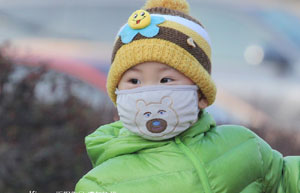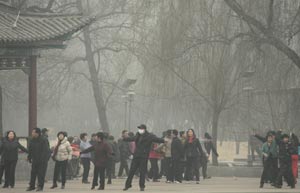Challenges in the air to foreign recruitment
By Wang Zhuoqiong (China Daily) Updated: 2014-03-27 08:33The continual smog affecting the country's major cities has created problems in terms of recruiting workers at foreign-invested companies as expatriates fear to put their own and their families' health at risk, industry insiders said.
The biggest issue is not so much investment or business decisions but recruitment, according to Roland Decorvet, chairman and chief executive officer of Nestle for the Greater China Region.
"We are really struggling to persuade people to move to Beijing - especially people with children," he told China Daily.
"We certainly don't want to increase our offices here. We'd rather increase them in places other than Beijing."
Decorvet said the company has made an effort to clean the offices' air and has given subsidies to employees for air cleaners at home.
But what employees worry about most is their children, said Decorvet, who as of May 1 is leaving Nestle to take a position at Mercy Ships, a charity organization.
The Swiss native will be succeeded by John Cheung, who is from Hong Kong.
For its part, Panasonic Corp of China said that it is paying a "hazard bonus for those foreign employees located in a challenging environment".
In negotiations this spring, revisions of salaries and labor conditions were discussed based on the air quality in China, the company's communication office said. But no decision was made.
The Financial Times reported on March 12 that the Japanese electronic company would offer air pollution compensation to their workers in China.
Panasonic is not the first to subsidize expats living in smog-affected cities, but it is the first to acknowledge that the allowance is specifically related to smog, according to Max Price, partner of Antal International China, a recruitment specialist based in the United Kingdom.
Price from Antal called it a dangerous precedent, which could be seen as putting a price on the health of individual workers.
Employers already are offering extra health insurance for foreign workers in China, with some companies "pollution-proofing" their buildings with air filters and window sealing, he said.
Such situations have become more prevalent. Some foreign professionals have decided that enough is enough and have asked for repatriation or an assignment away from China, according to Price.
 |
 |
- NHTSA says finds no 'defect trend' in Tesla Model S sedans
- WTO rare earth ruling is unfair
- Amway says 2014 China sales may grow 8%
- President Xi in Europe: Forging deals, boosting business
- CNOOC releases 2013 sustainability report
- Local production by Chery Jaguar Land Rover this year
- Car lovers test their need for speed in BMW Mission 3
- China stocks close mixed Monday

















